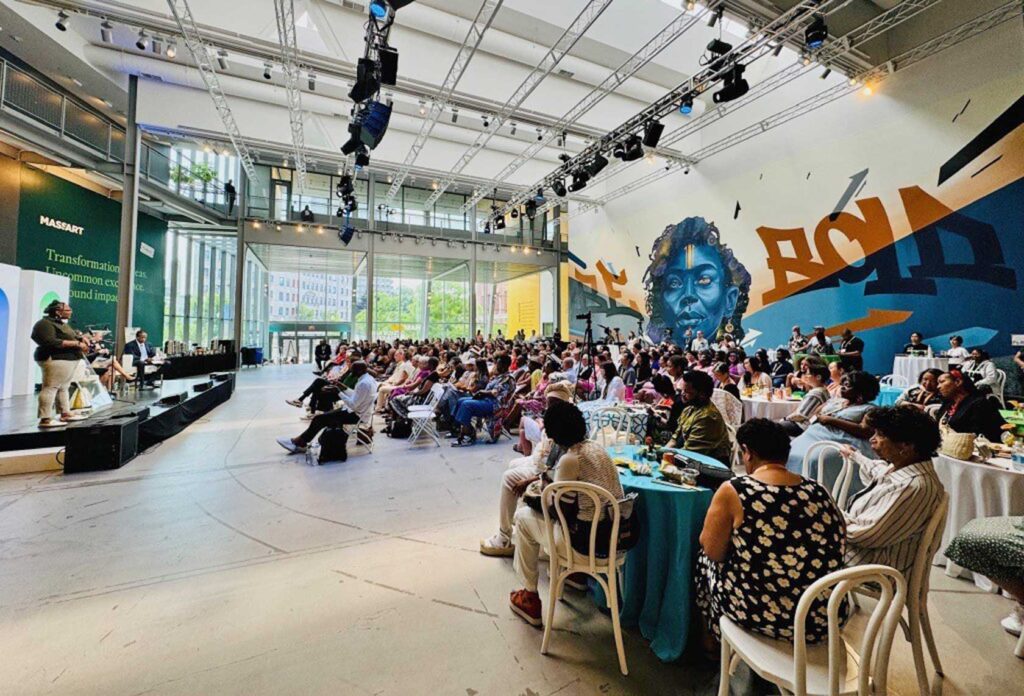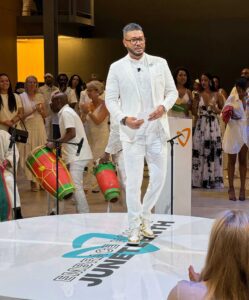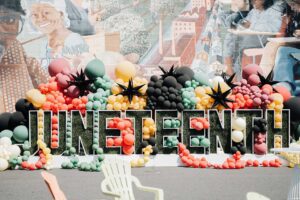
Continuing its mission of creating a sense of belonging, Embrace Boston brought an array of events and panels to the city last week as part of the latest installment of its Embrace Ideas Festival.
Now an annual summer fixture in Boston bringing together local and national leaders and community members, the festival began as a way to commemorate Juneteenth through the celebration of Black arts and culture.
“When Juneteenth became an official holiday, we knew that it was an opportunity — especially when it happened during the pandemic, and in the aftermath of the murder of George Floyd — to create some customs and rituals around this holiday for Boston that brought people together,” said Imari Paris Jeffries, president and CEO of Embrace Boston, in an interview.

Embrace Boston President and CEO Dr. Imari Paris Jeffries addresses the crowd at Embrace Honors commemorating the work of civic, business, and community leaders. PHOTO: EMBRACE BOSTON
The first Embrace Ideas Festivals spanned five days with events across the city. This year’s was shorter, with the main programming held primarily at the MassArt Design and Media Center in the days following Juneteenth. In all its iterations, though, celebrating Black ideas, Black joy and Black art is always at the heart of the festival, Paris Jeffries said.
He added that he sees a general “dislike for Boston,” with the caveat that he didn’t want to generalize. But the city has an “international draw” thanks to its status as a hub of higher education. By showcasing local and international thought leaders alongside one another, the festival was also an opportunity to change people’s perceptions of the city.
In the past, Embrace Ideas Festival has attracted big names, including journalist Nikole Hannah-Jones, professor Annette Gordon-Reed and author Heather McGee. Last week, Pulitzer Prize-winning journalist and author Isabel Wilkerson gave the keynote address before her conversation with president and CEO of The Boston Foundation, Lee Pelton, and executive and artistic director of the Roxbury International Film Festival, Lisa Simmons.

Embrace Boston hosts the annual Embrace Ideas Juneteenth Block Party celebration rooted in racial equity, healing, wellbeing and joy. PHOTO: EMBRACE BOSTON
Putting together the festival took about a year of planning, said Elizabeth Tiblanc, the organization’s vice president, arts and culture, and a lot of thought went into selecting the speakers.
Each year, the Embrace Boston team considers the people who are “essential to the work,” Tiblanc said. Wilkerson, for example, was a voice they knew they wanted to have in the festival for a long time, particularly because her work aligns with Embrace Boston’s goal of “building the culture of repair,” Tiblanc said.
Tiblanc’s role was part curator and part logistical organizer. She focused on fleshing out the festival’s vision and bringing it to life. Behind the scenes, there were staff members, a marketing team and sponsors working with Embrace Boston to make the festival possible.
The food and drink vendors also added to the atmosphere, she said. Brockton Beer Company, for example, created a special brew just for the festival called “Summer in the City.” And then of course, there were the venues, partners Tiblanc said have “long been doing the work of racial justice, and who continue to open their doors in a way that…adds to that sense of belonging that we’re building.”
When crafting the programming, the team thought about the various prongs of arts and culture: scholarship, academia, visual and performance arts and more. But most important was making sure the programming created “platforms for Black people during the week of Juneteenth,” Tiblanc said.
This is a significant year in Boston’s cultural history. The Embrace Ideas Festival, which overlapped with the start of the Roxbury International Film Festival, took place alongside the Celtics championship celebrations.
This year is also the 50th anniversary of the busing crisis.
With this in mind, Paris Jeffries said the festival, in the context of the anniversary, offered a moment to reflect on “the ghosts that live here, the feelings that people of color and Black people have who have lived through those experiences.”
Both Paris Jeffries and Tiblanc said they also wanted attendees to simply have fun, and the programming included playful and joyful events to make that happen.
Friday’s “Chef vs Chef” event pitted two chefs against one another as they shared their takes on quintessential African American dishes. World-renowned chef Marcus Samuelsson also stopped by for a chat with culture columnist and festival mainstay Jeneé Osterheldt.
In addition to the chef showdowns, the festival lineup culminated in a block party at Roxbury Community College, marking the end of a week’s worth of celebrations across the city.
Paris Jeffries said he feels “heartened by seeing the increasing number of Juneteenth celebrations every year,” especially given that Embrace Boston was “one of the earliest groups to illuminate Juneteenth as a pivotal holiday.” This year, undeterred by the heat, people celebrated from Brookline to Franklin Park.
“What excites me about Juneteenth and our work around narrative,” Paris Jeffries said, “[is] placing and lifting up Black folks and other people of color in positive lights.”






